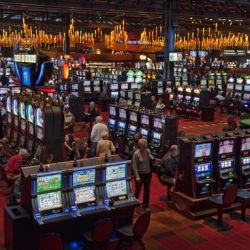PA Casino Revenue Flat in Fiscal 2016

The Pennsylvania Gaming Control Board (PGCB) recently released its gaming results for the 2016/2017 fiscal year, revealing a 0.8 percent drop in revenue compared to the same fiscal period the year before. Nevertheless, the $3.2 billion the state’s 12 land-based casinos generated from their table games and slot machines represented Pennsylvania’s second most successful year to date, further consolidating its position as the country’s second biggest gambling market to Nevada.
Concern or Celebration?
Following the results covering the 12 months from July 1st, 2016 to June 30th, 2017 being released, Doug Harbach, Director of Communications for the Pennsylvania Gaming Control Board, hailed the resilience of the state’s casino market, stating:
“Given that we have competition in every state around our borders, the fact is that gaming revenue has stayed amazingly steady for the last number of years.”
Despite his optimism, and the fact the year-over-year retraction was less than one percent, the numbers still hold concern for both government officials and operators alike. Furthermore, those concerns are likely only to be compounded going forwards as state lawmakers in Harrisburg are currently considering a gambling expansion that would see slot machines placed inside airport terminals, bars and restaurants, as well as truck stops. If this should eventually happen, it would all but guarantee that Pennsylvania’s commercial casinos would take a further hit to their gaming revenues.
Examining the Market
Parc Casino, situated near Philadelphia, was Pennsylvania’s top earner during the 2016 fiscal year with its gross revenue from table games coming in at $701.1 million, and from slot machines at $386 million. Meanwhile, the Sands Bethlehem posted $304.2 million in slot revenue, and $218.6 million from its table games, resulting in a total revenue for the fiscal year of $522.8 million. Consequently, Parc Casino generated 17.7 percent of Pennsylvania’s revenues for the fiscal year, and Sands Bethlehem a further 16.3 percent, meaning that the two properties were responsible for nearly 34 percent of the state’s entire casino market.
Smoking Issue
Outside of Philadelphia, Pennsylvania casinos are still letting their customers smoke while they play. However, a new poll recently conducted by the Breathe Free Pennsylvania Coalition found that 69 percent of all adults in Pennsylvania want to see the indoor smoking ban extended to bars and casinos. Of those, 64 percent said that they would also like to see the ban extended to include electronic cigarettes.
Self-Exclusion Program
Helping to protect vulnerable people from developing gambling problems is always a chief concern for a state’s lawmakers, with gambling self-exclusion programs just one of the ways they are able to offer assistance to those most in need. Up to June 30, 2017, there has been 11,567 gamblers who have opted to use the program in Pennsylvania, with the ratio split 60:40 between men and women using the program.
Overall, 58 percent of self-excluded gamblers banned themselves from gambling for 1-year, while 20 percent requested a 5-year ban, and 22 percent opted to ban themselves from gambling for life.
Online Gambling
Pennsylvania has been trying to sort out its budgetary woes for some time now, with one idea to plug the $1.5 billion shortfall involving adding online gambling to its gambling expansion proposal. As is well known in the industry, Las Vegas Sands CEO Sheldon Adelson, whose company owns the Sands Bethlehem, is a staunch campaigner against online gambling, and earlier this year was looking to sell the property to MGM Resorts. The deal fell through, though, and meanwhile there has been little progress made on either negotiating a new state budget, or pushing forwards online gambling legislation.
If finally embraced, online gambling is expected to generate up to $350 million per annum by the year 2022. Combined with an expansion of its land based gambling industry, this could help put a significant dent in the state’s budget deficit, and as Rep. Ryan Bizzarro explains:
“Lawmakers debated a revenue package last week, that called for expanding online gaming, legalized video gaming at truck stops, and so-called mini casinos in rural areas of the state, which by some estimates could generate at least $200 million. I don’t see how they do not have gaming as part of this equation moving forward.”







